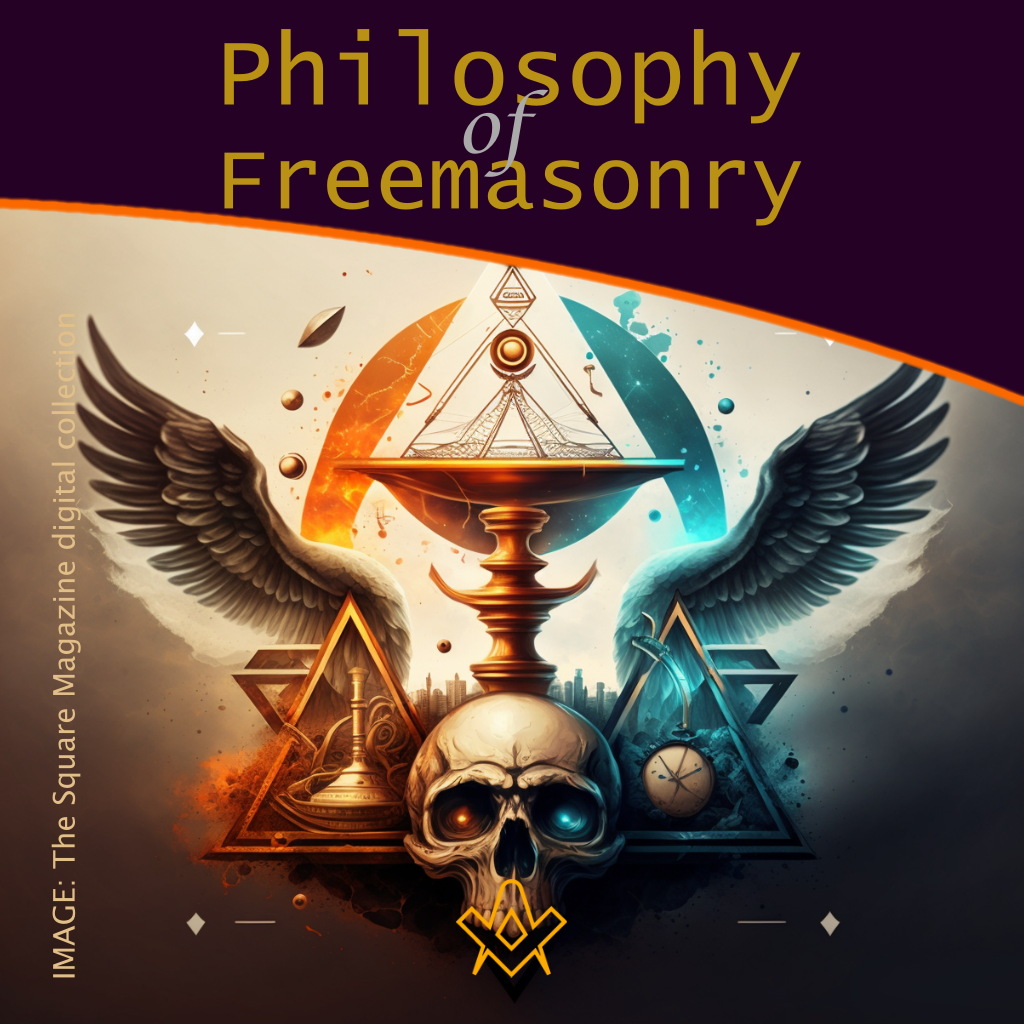The end of philosophy is to free the mind from those incumbrances which hinder its progress toward perfection, and to raise it to the contemplation of divine and spiritual objects
![]()
When wisdom entereth into thy heart,
and knowledge is pleasant unto thy soul,
discretion shall preserve thee,
and understanding shall keep thee
— Prov. ii : 10, 11.
Introductory Lecture.
A PURSUIT devoted to the philosophical study of Freemasonry, comprehending it in its speculative features and in its symbolical structure, is a labor to which but a very small number composing the vast host of its votaries have given any thing of a very general consideration or attention.
And although its system comprehends a range embodying various subjects of interest, presenting to the mind of an investigating inquirer a field fertile in resources for intellectual acquisition and moral culture, yet it does not receive that consideration justly due to its importance, in respect to its requirements and the bearing its obligations have upon us.
Within the range of its sphere is comprehended an area amply extensive for the employment of the most enlarged mind, and one wherein the Masonic student can cultivate and develop his capacities for usefulness, as applicable to the several pursuits and various stations of human life ;
– and one also wherein he ought to devote at least a reasonable share of his time, in order that he may have a just conception of the real purposes of the institution, and of its designs, to correctly understand the real principles of its organization, for its practical application, as well as for its theoretical illustrations.
The theory of Freemasonry is based upon the practice of virtuous principles, inculcating the highest standard of moral excellence.
The philosophy of its science is the love of logical reasoning, a desire for knowledge, the possession of which enables us to exercise prudence in our judgment, discrimination in our choice, and to estimate matters and things according to their just value and consideration.
An investigation of the primary principles involved within the theory of its organization, comprehended for the practical purposes to which it ought to be applied, requires application of the mind, and the exercise of our intellectual faculties, wherein our wisdom and discretion display themselves in the judgment we form, through the judicious reasoning our abilities afford us ; and this constitutes the philosophy of our speculative science.
Its system of imparting instruction is figurative in its manner, illustrating the precepts taught within its various apartments by symbolical representations, all of which are, when reduced in their practical operations, conducive to the best interests for man’s happiness in the various relations of his social intercourse.
For whatever his condition or circumstance may be, whether surrounded with affluence and ease, or toiling with daily labor for the sustenance of life, he still remains a being susceptible of improvement.
His nature is progressive, and he must either advance or retrograde.
Such are the peculiarities of man’s nature, inherent in his constitutional structure, that he is more or less the creature of controlling influences surrounding him ; and the more susceptible in yielding are the affections, swerved in their passions, through the manner in which they are operated upon.
Place two objects before the mind, one arrayed in all that is pleasant and agreeable to the emotions of our senses, the other in that which is repelling to the more refined and sensitive feelings of our nature, and we recoil from the latter, while the power of attraction that controls and influences our will, draws us to that which is most agreeable to the sensations of our affections, or enlisting of our sympathies.
Hence, the virtues, symbolized by figurative illustrations, become more or less attractive to the mind, winning upon the affections, powerful in impressions, and lasting in influence, through the manner of their presentation.
We make allusions, referring to the esoteric and exoteric apartments of our system.
Within them are comprehended the theoretical principles embodied within its speculative organization; and as such they are but symbols, illustrative of the indwelling principles innate to our human natures, and that lie concealed within our own breasts, unobserved to mortal eye.
The mind and conscience as the sanctuary is the esoteric apartment wherein virtuous principles and every good quality must fructify, if we expect the fruits of their acts to display themselves in the exoteric apartments of life.
Hence, when our system, with its signs, with its symbols, and its figurative illustrations, is properly understood, it presents to the mind an epitome of man’s present state — his life of probation; allegorically representing his future one, the perfection of which is in proportion as he lives in obedience to the requirements of his present one.
To regard the institution merely for its forms and ceremonies is an idle waste of time, unproductive of any advantage or benefit, either individually or collectively, and it is not adhering in compliance with its requirements, as enjoined in the practice of its teachings.
To appreciate its importance, and make it a medium of usefulness, we must have a correct conception of its real purposes, and understand the nature and intent of their bearings.
The organization is peculiar in its construction. It possesses both positive and negative points, embracing duties obligatory upon Masons, binding to either.
Hence, a recognition of Masonic duties requires application of mind to fully understand the laws and regulations governing the Fraternity.
As an organization of human structure, it has claimed minds and intellects of all capacities, and in all countries, wherever intelligence and enlightenment of reason and liberality of mind have existed, from the most enlarged to the less capacious in ability, from the highest to the more humble stations in life, regarding the moral worth of man, without reference to worldly distinctions and honors, as the considerations most worthy of acceptance — all who have knelt at its altars and worshiped at its shrine.
And why? Because it is a brotherhood, recognizing all men as the offspring of one Common Parent, the source of creation ; governed by a spirit of good will for all His works, imbuing the affections with sentiments pure and holy, mingled in love of gratitude to Him, and flowing in undulating streams, genial with kindness and sympathetic feeling for each other, as inculcated in one of the sublime tenets of our Fraternity, Brotherly Love.
And this is one of the esoteric workings of the affections.
We say, that a proper knowledge of speculative Freemasonry requires thought and application of the mental faculties.
Yet, such is the frame of the human mind, such its construction, and such its varied elements, that the great masses are more generally content with the mere forms and ceremonies, the external show and the outward display, than with the more substantial enjoyments, to be secured by application of the mind in the pursuit of knowledge, using its energies in the investigation of subjects claiming its attention, as worthy of its highest consideration.
For such we can say that Masonic light has not achieved much in the attainment of knowledge for their intellectual improvement, and for their usefulness in the advancement of the great purposes of our institution.
They fall short of filling one of its most important and valued requirements, to constitute their ” worth and merit ” for eminence, a distinction at all times worthy of honorable attainment.
We, measurably, seem to live in this world, engage in its daily affairs, eagerly contending and striving for the possession of its temporal treasures, which too often proves more to our disadvantage than otherwise, producing more anxiety, and often unhappiness of mind, than enjoyments affording us contentment and happiness.
Impelled onward by the turbid current of surrounding events, we seem to regard matters and things as though our whole existence was confined to this, our present short and limited state.
So absorbed do we become in the busy cares surrounding us, that our higher and nobler qualities too often become overlooked, neglected, and remain unimproved; and the real uses and purposes of life thereby often become perverted.
Our affections so engrossed with the cares surrounding them, as, in the process of time, they become so absorbed with selfishness as to make us indifferent in feelings of interest for others, and a benevolent disposition often degenerates into a selfish one.
It is often the case, that an uninterrupted tide of prosperity hardens our natures, and leads us to treat with a feeling of hauteur those in more humble circumstances, yet, in many respects, far our superiors in the value of their worth for usefulness of service to their fellow-beings.
We do not wish it to be inferred from this that we are to be indifferent as to our interests in the pursuits of life, to secure its comforts and such of its provisions as will enable us, through industry in our occupation, to increase our worldly means;
– but that we ought so to apportion our time as to devote a share thereof for the mental culture and improvement of mind, that we may likewise have the benefit there-of, and partake of those rational enjoyments flowing from a cultivated mind, enriched with a store of information elevating to our natures, and enlarging within us a desire for usefulness.
It is this which constitutes the superior bestowments of a wise Providence, conferred upon us for our good, and to His glory and honor; for, as our Creator, we honor Him, as we seek to understand Him, and live in the faithful observance of His will.
To understand the theoretical principles of our institution, its real objects and purposes, requires mental application and study.
A thorough knowledge and a correct understanding of the latent principles which lie hid under the veil of its allegorical mysteries can only be attained through a diligent pursuit in the investigation of the several subjects presented for the consideration of the aspirant, who seeks truth through the light and knowledge revealed unto him ;
– and it likewise can only afford us real enjoyment and privileges to be appreciated when it is properly understood and conformed to in all its requirements;
– and its utility enhances in value as we become familiar with its true mission.
And this is the philosophy of speculative Masonry.
The enjoyment of a treasure exists in the effort we make to secure it, and the more laudable the enterprise, the higher the appreciation we bestow upon it.
For whatever object we pursue, with a desire for attainment, we should always investigate it, understand its value, its advantages, and the benefits to be derived from its possession, and of its usefulness.
And according as it serves our purpose, so we estimate its value.
Freemasonry is a science. It directs the inquiring mind to the most liberal and elevated pursuits of study; unveils to it a field for contemplation, and leads it into the channels of investigation and research.
It causes us to reason upon and judge of the propriety of all things, and, through the exercise of our powers of discrimination, enables us to separate the gems from the dross, and garner treasures of worth.
It develops and illustrates truths and principles vital to man’s interests and comforts in life.
It elevates him in the scale of human intelligence, enlarges his affections with a generous liberality toward others, expands the mind, and invites him to drink at the fount of Divine and human knowledge, partake of life-giving principles, and fits him for the more social and rational enjoyments of happiness flowing from a virtuous and upright life.
Freemasonry is inexhaustible in its resources.
In the apartments of its Arcanse are deposited treasures of jewels of inestimable worth.
There is not a subject or principle within the reach of the human mind that does not come under the range of its teachings.
It carries the mind from the most minute to the most exalted conceptions.
Through its various subjects, every faculty of our nature is brought into requisition, and an ample opportunity afforded for the display of their several powers.
It infuses within us a glowing spirit of emulation, makes man realize his superiority of earthly creation, and inspires within him a feeling that he is but little lower than the angels, and that he is an heir destined for an inheritance of eternity.
To us, in our philosophical or speculative character, it is the mine or quarry wherein we labor to bring forth virtues, purified from their external dross, to show forth as the jewels of excellence, that should distinguish us for uprightness and the practice of the precepts they inculcate.
If its labors consisted in nothing beyond the mere forms and ceremonies peculiar to its organization and its means of recognition, it would not be worth the time and attention bestowed upon it.
Yet, painful as it may be, this is about the extent too many bestow upon it, content to enjoy the privilege, without the knowledge to understand the true value thereof.
If its mark is not set for the attainment of the highest standard of human happiness, its object of the most enlarged and liberal system of philanthropy, aiming to confer upon man the greatest amount of good that his present state of existence can afford,
– impresses him with his responsibilities, and that he has an immortal nature, then are we mistaken in its mission, and have misconceived its real purposes.
It comprehends all that is needful to man’s desire for happiness, and repudiates all that is evil and conducive to his misery.
Its system of instruction illustrates the affinities existing between virtuous actions, flowing from pure motives, and contrasts their good effects over their opposites.
Such are the exemplifications and the teachings of our order, illustrated through figurative and symbolical representations.
He who conceives that the institution is of a mere alms-giving character, and that that is the sole object of its perpetuity, has but a very limited and contracted view of its mission, for that consists of but a part, constituting its benevolent feature, and, as such, is but a moiety in the field of its labors.
Its operations are far more extensive.
It is a drama, comprehending the whole sphere of man’s life, and devoted to his greatest interests in the economy and range of his human nature;
– a brotherhood universal in its recognition and sympathetic in its fellowship;
– for it considers man’s physical and intellectual endowments, regarding their advancement and proper development as being most conducive and subservient to his temporal happiness, and directing his thoughts to a more enduring life.
And this latter consideration is constantly and vividly kept in view.
If Masons were to view these things in their true light, how much higher would be the appreciation they would bestow upon the privileges granted them through our association !
– how much more deeply would they become impressed with the responsibilities assumed by them !
– and with how much greater and more sincere interest would they regard the nature of their obligations and duties in every relation of life!
A Mason’s confidence then would be what its purposes design, undoubting integrity in the sacredness enjoined by fidelity.
Man, in his present state, is a creature of time, subject to all the infirmities inherited through his fallen nature.
His own unaided powers but feebly serve him to bear up under the trials he is called to endure; hence, he needs a greater power, a stronger help ; and he is taught to seek that aid through a higher source.
He feels an inward influence that prompts him, impels and impresses him; and, as a constant admonition, is warning him, through the various trials he endures in this his present state of probation, not to rely upon his own feeble and unaided strength, but, under all circumstances, as a matter of safety, to repose his trust in God, as his only reliable and permanent source of security.
And this is allegorically illustrated in our speculative system.
It is not in the shedding of the blood of “bulls and goats,” nor in the mere observance of typical forms and ceremonies, that suffices our wants;
– but it is through the strength of the Lion of the tribe of Judah that man is to be raised from the temporal to the spiritual inheritance.
Corruption rests in the grave; but immortality dwells on high.
How often are we reminded of this when we follow the remains of a departed brother to his last final resting-place!
The Emblem of Innocence, the Badge of a Mason, reminds us of that robe of purity with which the immortal part shall be enrobed, and the Evergreen that immortality no longer dwells within the tenement of clay.
Raised from corruption to incorruption! The lost is found; restored to life again.
Forms and ceremonies must be observed, and are appropriate in their proper place; but it is in the pure essence and in the spirit of our teachings where the elements which constitute the most vital importance, both to our future, as well as our present state.
Devoid of these, the forms and ceremonies are but a meaningless and pageant show, like a structure profusely decorated with gorgeous ornaments, dazzling only to the vision; but resting on no foundation of permanent safety, secure from the danger of impending storms.
Hence, we should understand the purport and designs of the former, so as to distinguish between the shadow and the substance.
While we are engaged in the one that partakes of the outward display, let us not be unmindful, but realize the necessity of becoming imbued with the more substantial and important requirements secured through the other; for they constitute the life and spirit, while the former displays but the form and shadow.
Freemasonry is universal in its nature. We say that it is universal because it is a brotherhood embracing within the extent of its folds men of all denominations and creeds, enjoying the free exercise of their faculties, mentally and physically, and who can worship at her shrine and offer up a united prayer to one Great Supreme Being, One God, One Common Father to all.
This constitutes the bond of our union, its vitality, its strength, and its universality.
It is the great central power, whose almighty influence draws us together in confiding fellowship, and endearing our friendship.
And whosoever disavows allegiance to, or denies that Great Being, can not enter within the portals of our sanctuary.
The Philosophy of Freemasonry leads us into the investigation and research for truths. Symbolically illustrating the contrasts resulting through the actions of our lives, it imbues us with the necessity of being just and upright to all men and in all things, and forcibly impresses the mind, that true happiness consists in being obedient to Divine and moral law.
Such are the true principles illustrated and taught in our esoteric apartments, and to which we should faithfully live up to; and he who regards these maxims of truth will ever do so.
We have made the assertion that Freemasonry is a Science.
It is also an Art; for it embraces both features; and the union exists in the symbolical application we make through the illustrations of the several implements used by the operative in the erection of a structure.
In our system, which is speculative in its nature, we demonstrate our art by the use of the operative’s implements.
By their application in a figurative or symbolical sense, we illustrate the several virtues, and thereby convey truths to the mind, as being the most impressive and forcible mode of imparting instruction.
By their application, and the practice of the virtues illustrated thereby, we erect a moral edifice devoted to the service of God, our own happiness, and the well-being of our fellow-creatures, a duty meritorious in action and worthily claiming our highest consideration.
This system of communicating instruction, demonstrating principles and truths through the medium of symbols, has been practiced in all ages of the world.
The schools of the ancient philosophers were conducted upon this plan, illustrating and communicating instruction through the means of figures and allegorical representations.
Hence, there is a striking analogy existing between our mode of elucidating our system of imparting instruction and that practiced by the ancients, and it is also pretty conclusive evidence of the antiquity of our institution.
We stand, in that connection, in close proximity to those ancient systems; so much so, that we may justly claim a lineal descent.
Their systems, however, were all more or less obscure, and veiled under a large share of superstitious mystery, intended, through their influence, to hold the great masses in awe and veneration of obedience to their behests.
Yet, they taught the existence of a future life, one of bliss, where they would enjoy a felicity in the “Elysian Fields,” and which happy state could only be attained through a virtuous life and the endurance of severe trials of probation, as the ordeals to arrive at their happy and blissful state.
Our ceremonies are not shrouded in darkness, nor veiled in superstitious mystery; but they are founded upon reason and sound truths.
They are the emanations of virtuous principles, to elevate our characters, and exalt us to eminence and worth; for by our works are we to be judged; and the greater our privileges, the greater are our responsibilities, and the more will be required of us.
According to our light and knowledge, so we must walk.
A well-regulated life enables us to exercise a controlling influence over our passions, strengthens us with endurance of Fortitude, to sustain the trials and vicissitudes to which our human natures are constantly exposed, and prepares us to submit and bear them with patient resignation.
Our trials and afflictions are, in most instances, the result of our own imprudence, a digression from rectitude in some manner or other.
So prone are we to violate either some divine or moral law, that it seems like an infatuation innate to our natures to do so.
Yet, we invariably must pay the penalty for our digressions; for to every thing there is a corresponding equivalent or counterpart.
One of the greatest trials we have to contend with in this life is our infidelity, our want of faith.
We are constantly doubting and wavering. Our minds are vacillating and unstable. We have no fixed purpose, no safe moorage for a permanent anchorage.
Hence, we are like a vessel upon the ocean’s bosom, without compass or rudder, drifted to and fro upon its billows, as the sports of the wind may carry us.
If we were governed more by consistency and an established purpose of mind, relying with steadfast purpose and firmness of principle on the promises as made manifest to us, we would escape many of the dangers to which we are constantly exposed, and be less the sport of fortune’s freak, glide more safely through the rugged trials of life, and avoid the breakers upon which we are otherwise likely to founder.
Our faith, firmly established, would enable us to look forward to the goal of our Hope, in the confidence of enjoying a charity of boundless bliss.
Morality is a very commendable system to live by; but it does not meet the requirements.
Morality does not suffice man’s wants.
There remains a vacuum, and untenanted space, an uncultivated field that must be occupied and improved; and for the want of the material necessarily adapted to that improvement he must look to something of a higher nature.
Seek, and ye shall find;
ask, and ye shall receive;
knock, and it shall be opened unto you
Whatever enterprise we embark in, we should first consider it in all its several relations, its advantages, its value, and the benefits to be derived therefrom.
If the enterprise is laudable, we should be prepared to enter upon our labors with Freedom, Fervency, and Zeal, to make ourselves useful to the extent of our abilities.
We should seek with Faith, ask in Hope, and knock with the assured confidence that a generous Charity, in the rectitude of our intentions, will secure to us a favorable consideration, and gain us the desire of our wishes.
To be consistent to our profession, we must lay our corner-stone upon the foundation of Truth, and erect our moral temple agreeably to the rules prescribed by the various implements we use — cemented in the virtues that impart Wisdom, Strength, and Beauty, as the crowning attributes of its excellence.
The study of the principles of philosophy leads us to seek for truths, to investigate causes, and understand things in their true nature; and this we can not accomplish without labor.
Hence, to be useful in this life, we must be industrious, although a portion of our labors may not be productive of any immediate benefit to ourselves;
– yet we must labor, not only for our own individual interest, for, without any other consideration, that alone would be a selfish one, but for our fellow-beings also;
– and as the products of our industry develop themselves in usefulness, display our own abilities, others derive a share of benefit therefrom.
So that our influence extends abroad, and has its good and happy effect.
The great aim and consideration should be to direct our energies in the pursuit of such labors as are best adapted to our several capacities, whether of a mental or physical nature.
If we would study to seek this, understand the bent of our own inclinations, the genius of our natures, and devote our efforts in the pursuit of such labors as we deem best adapted to our capacities, our efforts would be productive of a greater amount of human happiness.
We are all, to a certain extent, more or less dependent upon each other.
The service one may render can not, perhaps, be performed by another.
And it is providentially ordained that the arrangement be so.
Our capacities and tastes differ; our inclinations vary and flow into different channels; and what may be a profitable field of labor for one, may be a barren and unproductive one to another.
Yet, such is the arrangement in the economy of nature, that each, in his proper sphere, contributes his share to the storehouse of usefulness, for the general good of all.
And this order or system extends through the whole works of creation, distributing just proportions throughout all her operations.
These are the principles illustrated in the science of philosophical Freemasonry:
– calculated in their influences to bring forth and develop the energies of our better qualities,
– and lead the mind into the research of things,
– and their investigation for truths,
– and to draw therefrom that knowledge which will enable us so to employ our time in profitable labors, productive, in their worth, to the real value and substantial enjoyments of life, the possession of which constitutes man’s happiness upon earth, and as such is the highest consideration he should aspire to attain.
To labor for the advancement of human happiness is commendable.
It produces within us a philanthropic spirit;
– expands the affections in sentiments of generous liberality;
– frees the mind from the influence of selfishness, intolerance, and bigotry;
– causes us, with consideration, to regard and respect the opinions of others, while it secures their esteem for ourselves.
It awakens the sensibilities of our better natures, and gives an impetus to their actions.
It is consistent with Divine will and authority, ennobles man, and honors the great Creator.
And this is the great aim and end sought to be accomplished through the practical workings of speculative Masonry.
Whoever, therefore, has been, and is permitted to embark in our labors, and enjoy our privileges, and does not comprehend the institution in this light, has but a very narrow and contracted conception of its purposes and designs, and is in a benighted state as to its true mission.
These considerations, then, being the principles upon which our institution is founded, it must be obvious to the mind of every reflecting and well-informed Mason, that the responsibilities he has assumed are of no light or trifling nature ;
– but are calculated, in sober truth, to awaken within him a lively interest as to his real duties, that his responsibilities are of a weighty nature,
– and as he deports himself, so will he be judged by his works, and his award apportioned according to his just deserts.
His honor, his reputation, and his unsullied beauty of character are involved in his fidelity to truth and justice, and will show forth in the consistency of his bearing, as a noble illustration of the value of our institution, as it rests upon the faithful performance of his obligations to obey its precepts, according’ to their “tenure.”
*Edited for length and clarity.
Article by: Jacob Ernst

The Philosophy of Freemasonry;
By: Jacob. Ernst (Author)
This work has been selected by scholars as being culturally important, and is part of the knowledge base of civilization as we know it. This work was reproduced from the original artifact, and remains as true to the original work as possible.
Therefore, you will see the original copyright references, library stamps (as most of these works have been housed in our most important libraries around the world), and other notations in the work.
This work is in the public domain in the United States of America, and possibly other nations. Within the United States, you may freely copy and distribute this work, as no entity (individual or corporate) has a copyright on the body of the work.
As a reproduction of a historical artifact, this work may contain missing or blurred pages, poor pictures, errant marks, etc. Scholars believe, and we concur, that this work is important enough to be preserved, reproduced, and made generally available to the public.
We appreciate your support of the preservation process, and thank you for being an important part of keeping this knowledge alive and relevant.
Recent Articles: symbolism
 Legends and Symbols in Masonic Instruction Explore the significance of Masonic legends and symbols in this insightful post. Discover how Freemasonry imparts wisdom through allegorical narratives and emblematic imagery, revealing profound moral and philosophical lessons. Unveil the deep connections between Masonic teachings and the broader quest for understanding life’s fundamental questions. |
 Discover the mystical significance of the number 33. From its mathematical marvels and artistic influence in numerology to its esteemed place in Freemasonry, delve into the history and power of this master number. Explore why 33 holds such profound meaning in various spiritual and philosophical traditions. |
 The Practice of Freemasonry - P1 Embark on a transformative journey with Freemasonry, where the exploration of your Center unlocks the Perfect Ashlar within. Through the practices of Brotherly Love, Relief, Truth, and Cardinal Virtues, discover a path of enlightenment and self-improvement. Embrace the universal creed that binds us in the pursuit of our true essence. |
 Discover the fascinating history and significance of the Warrant of Constitution within Freemasonry. Unveil the evolution of this crucial authorization, its role in legitimizing Lodges, and its lasting impact on the global brotherhood of Freemasons. Explore the intricate link it provides between tradition and modern practice. |
 Freemasonry: Unravelling the Complexity of an Influential Organization Mysterious and captivating, Freemasonry has piqued the interest of seekers and skeptics alike. With its intricate blend of politics, esotericism, science, and religion, this enigmatic organization has left an indelible mark on society. Prepare to delve into the secrets of Freemasonry and unlock its hidden depths. |
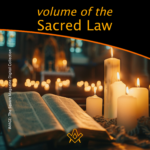 Unlocking the Mysteries of Freemasonry: In the hallowed halls of Freemasonry, a powerful symbol lies at the heart of ancient rituals and teachings—the Volume of the Sacred Law. This sacred book not only guides the spiritual and moral journey of Freemasons but also serves as a beacon of universal wisdom and enlightenment. |
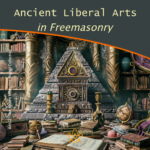 The Ancient Liberal Arts in Freemasonry Embark on a journey of self-improvement and wisdom with Freemasonry's guiding principles. Ascend the winding stairs of moral cultivation, analytical reasoning, and philosophical understanding. Embrace arithmetic's mystical properties and geometry's universal truths. Let the harmony of the universe inspire unity and growth. Discover the profound, hidden knowledge in Freemasonry's path to enlightenment. |
 Initiation rituals around the world are filled with fascinating elements and different images. One of them is that of darkness. When societies speak of darkness, they often mean a lack of knowledge, a lack of choice, or a symbol of evil. During initiation rituals, darkness is used to represent the initiate's lack of knowledge about the world, society, and initiation in general. It can also represent the initiate's inability to make a choice or endure a situation. Whether you have participated in an initiation rite or not, the meaning of darkness remains an intriguing concept worth exploring. Initiation rituals around the world are filled with fascinating elements and different images. One of them is that of darkness. When societies speak of darkness, they often mean a lack of knowledge, a lack of choice, or a symbol of evil. During initiation rituals, darkness is used to represent the initiate's lack of knowledge about the world, society, and initiation in general. It can also represent the initiate's inability to make a choice or endure a situation. Whether you have participated in an initiation rite or not, the meaning of darkness remains an intriguing concept worth exploring. |
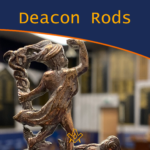 Masonic Deacon rods potentially trace their origins to Greek antiquity, symbolically linked to Hermes' caduceus. As Hermes bridged gods and mortals with messages, so do Masonic Deacons within the lodge, reinforcing their roles through ancient emblems. This connection underscores a profound narrative, weaving the fabric of Masonic rites with the threads of mythological heritage, suggesting the rods are not mere tools but bearers of deeper, sacred meanings that resonate with the guardianship and communicative essence of their divine counterpart, Hermes, reflecting a timeless lineage from myth to Masonic tradition. |
 The biblical pillars erected by Solomon at the Temple's porch, hold a profound place in history. These brass behemoths are not mere decorations; they are symbols of strength, establishment, and divine guidance. Explore their fascinating construction, dimensions, and the deep meanings they carry in both biblical and Masonic contexts. |
 Unlocking the Mind's Potential: Dive deep into ground breaking research revealing how simple daily habits can supercharge cognitive abilities. Discover the untapped power within and redefine your limits. Join us on this enlightening journey and transform your world! |
 Dive deep into the symbolic importance of the trowel in Masonry, representing unity and brotherly love. From its historical roots in operative masonry to its significance in speculative masonry, this article explores the trowel's multifaceted role. Discover its connection to the sword, the story of Nehemiah, and the Society of the Trowel in Renaissance Florence. Unravel the layers of meaning behind this enduring Masonic symbol. |
 Symbolism of The Builder's Jewel Batty Langley's "The Builder’s Jewel" (1741) is a visual masterpiece of Masonic symbolism, showcasing Langley's deep understanding of Freemasonry. The frontispiece highlights key symbols like the three pillars and the legend of Hiram Abiff, emphasizing Langley's dedication to Masonic traditions and teachings. |
 Unveil the mystique of the colour blue in Masonic symbolism. A hue evoking universal friendship and benevolence, its roots span ancient cultures, infusing Freemasonry's core values. This article explores blue's profound significance, guiding Freemasons towards wisdom and spiritual enlightenment. Discover the fascinating journey of this universal symbol. |
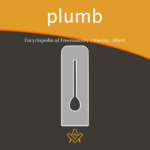 Discover the intriguing world of the plumb in Masonic symbolism with our in-depth analysis. Uncover its rich history, moral teachings, and significance in Freemasonry, guiding members on their path to truth, integrity, and justice. Immerse yourself in the captivating power of this symbol that shapes lives within the brotherhood. |
 Unlock the mysteries of Freemasonry with 'The Key,' a profound Masonic symbol. This seemingly simple instrument holds a deeper meaning, teaching virtues of silence and integrity. Explore its ancient roots, from Sophocles to the mysteries of Isis, and discover how it symbolizes the opening of the heart for judgment. |
 Unlock the secrets of the Freemasonry with The Blazing Star - a symbol that holds immense significance in their rituals and practices. Delve into its history, meaning and role in the different degrees of Freemasonry with expert insights from the Encyclopedia of Freemasonry by Albert Mackey. Discover the mystique of The Blazing Star today! |
 There is no symbol more significant in its meaning, more versatile in its application, or more pervasive throughout the entire Freemasonry system than the triangle. Therefore, an examination of it cannot fail to be interesting to a Masonic student. Extract from Encyclopedia of Freemasonry by Albert Mackey |
 The Hiramic Legend and the Myth of Osiris Hiram Abiff, the chief architect of Solomon’s Temple, is a figure of great importance to Craft Freemasonry, as its legend serves as the foundation of the Third Degree or that of a Master Mason. He is the central figure of an allegory that has the role of teaching the Initiate valuable alchemical lessons. Although his legend is anchored in biblical times, it may have much older roots. |
 This rite of investiture, or the placing upon the aspirant some garment, as an indication of his appropriate preparation for the ceremonies in which he was about to engage, prevailed in all the ancient initiations. Extract from The Symbolism of Freemasonry by Albert G. Mackey |
 The All-Seeing Eye of God, also known as the Eye of Providence, is a representation of the divine providence in which the eye of God watches over humanity. It frequently portrays an eye that is enclosed in a triangle and surrounded by rays of light or splendour. |
 What's in a Word, Sign or Token? Why do Freemasons use passwords, signs, and tokens? As Freemasons we know and understand the passwords, signs and tokens (including grips), which are all used a mode of recognition between members of the fraternity. |
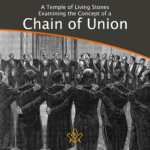 A Temple of Living Stones: Examining the Concept of a Chain of Union What are the origins of the Chain of Union? And how did they come about ? The answers may surprise some members as W Brother Andrew Hammer investigates, author of Observing the Craft: The Pursuit of Excellence in Masonic Labour and Observance. |
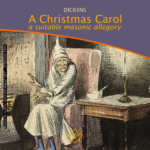 One of the best loved stories for the festive season is ‘A Christmas Carol’. A traditional ghost story for retelling around the fire on a cold Christmas Eve, it is a timeless classic beloved by those from all walks of life. Philippa explores the masonic allegory connections… |
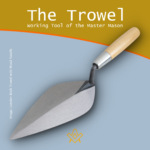 The Trowel - Working Tool of the Master Mason The Trowel is the symbol of that which has power to bind men together – the cement is brotherhood and fellowship. |
 Two Perpendicular Parallel Lines The point within a circle embordered by two perpendicular parallel lines, with the Holy Bible resting on the circle, is one of the most recognizable symbols in Freemasonry. It is also one which always raises a question. How can two lines be both perpendicular and parallel? |
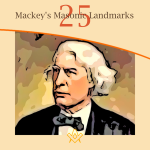 "The first great duty, not only of every lodge, but of every Mason, is to see that the landmarks of the Order shall never be impaired." — Albert Mackey (1856) |
 It is common knowledge that the ancient wages of a Fellowcraft Mason consisted of corn, wine, and oil. |
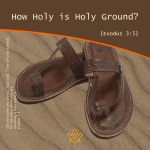 “Do not come any closer,” God said. “Take off your sandals, for the place where you are standing is holy ground.” Exodus 3:5 |
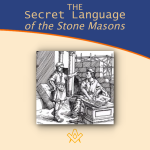 The Secret Language of the Stone Masons We know of Masons' Marks but lesser known are the 'argots' used by the artisans - in part 2 of a series on the social history of the Operative Masons we learn how the use of secret languages added to the mystery of the Guilds. |
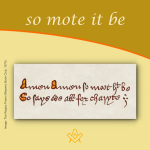 The phrase appears in the Regius Poem. It is customary in contemporary English to end prayers with a hearty “Amen,” a word meaning “So be it.” It is a Latin word derived from the Hebrew word - Short Talk Bulletin - Vol. V June, 1927, No.6 |
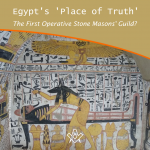 Egypt's 'Place of Truth' - The First Operative Stone Masons' Guild? Was ancient Egypt's 'village of the artisans' the first operative stone masons' guild? And was their use of 'identity marks' a forerunner of the Mason's Marks of the cathedral builders of the Middle Ages? Read on for some possible answers… |
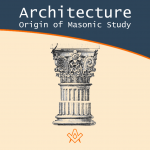 The Pieces of Architecture and the Origin of Masonic Study Discover the journey of the Apprentice – from Operative to Speculative. This journey has been carried out since the times of operative Freemasonry but today the initiate works in the construction of his inner temple. |
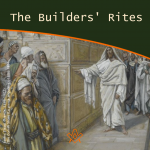 The Builders' Rites - laying the foundations operatively and speculatively The cornerstone (also ‘foundation’ or ‘setting’ stone) is the first stone to be set in the construction of the foundations of a building; every other stone is set in reference to this. |
 Applying the working tools to achieve our peculiar system of morality. |
 We take an in-depth look at the 47th Proposition of the 1st Book of Euclid as part of the jewel of the Past Master. |
 The Cable Tow: Its Origins, Symbolism, & Significance for Freemasons - Unbinding the significance of the cable tow. |
 We examine at one of the most impressive moments of the initiatory ceremony, a certain rite known as Circumambulation, and ask what is its meaning and purpose ? |
 So, what is the Level? And why do we use it in Freemasonry? |
 What is the mysterious pigpen or Masonic cipher that has been used for centuries to hide secrets and rituals? |
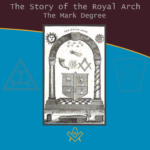 The Story of the Royal Arch - The Mark Degree Extracted from William Harvey's 'The Story of the Royal Arch' - Part 1 describes the Mark Degree, including the Working Tools. |
 Ashlars - Rough, Smooth - Story of a Stone How we can apply the rough and smooth Ashlars with-in a masonic context |
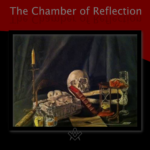 A detailed look at the Chamber of Reflection: A Revitalized and Misunderstood Masonic Practice. |
 Exploring the origin and symbolism of Faith, Hope and Charity |
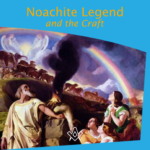 The Noachite Legend and the Craft What is it to be a true Noachidae, and what is the Noachite Legend and the Craft ? |
 In Masonic rituals, Jacob’s ladder is understood as a stairway, a passage from this world to the Heavens. |
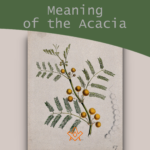 What is the meaning of the Acacia and where did it originate ? |
 What is the connection with the Feasts of St John and Freemasonry |
 The Forget-Me-Not and the Poppy - two symbols to remind us to 'never forget' those who died during the two World Wars. |
 Biblical history surrounding the two pillars that stood at the entrance to King Solomon's Temple |
 Is there a direct link between Judaism and Freemasonry? |
 The symbolism of the beehive in Masonry and its association with omphalos stones and the sacred feminine. |
 The Wages of an Entered Apprentice |
 An explanation of the North East corner charge which explores beyond one meaning Charity - |
 A brief look at the origins of the two headed eagle, probably the most ornamental and most ostentatious feature of the Supreme Council 33rd Degree Ancient and Accepted (Scottish ) Rite |
 A Muslim is reminded of his universal duties just as a Freemason. A Masonic Interpretation of the Quran's First Two Chapters |
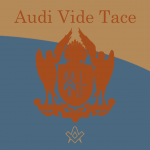 The three Latin words -{Listen, Observe, Be Silent}. A good moto for the wise freemason |
masonic knowledge
to be a better citizen of the world
share the square with two brothers

click image to open email app on mobile device


